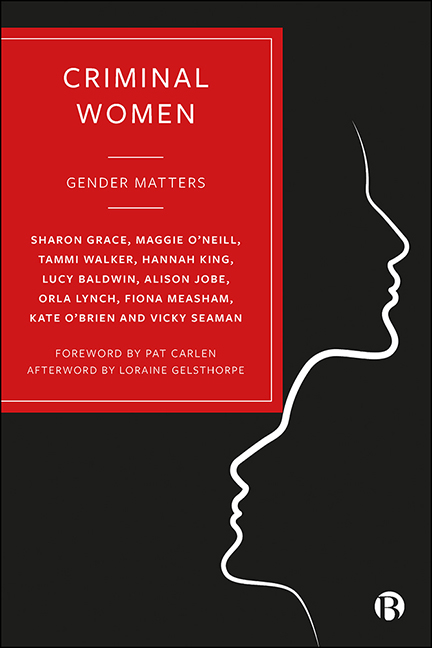Book contents
- Frontmatter
- Contents
- List of Figures and Table
- Notes on the Authors
- Acknowledgements
- Foreword
- Introduction
- 1 Hearing the Voices of Women Involved in Drugs and Crime
- 2 Knifing Off? The Inadequacies of Desistance Frameworks for Women in the Criminal Justice System in Ireland
- 3 Sex Work, Criminalisation and Stigma: Towards a Feminist Criminological Imagination
- 4 Criminal Women in Prison Who Self-harm: What Can We Learn from Their Experiences?
- 5 Criminal Mothers: The Persisting Pains of Maternal Imprisonment
- 6 ‘The World Split Open’: Writing, Teaching and Learning with Women in Prison
- 7 Women’s Biographies through Prison
- Afterword
- Index
1 - Hearing the Voices of Women Involved in Drugs and Crime
Published online by Cambridge University Press: 15 September 2022
- Frontmatter
- Contents
- List of Figures and Table
- Notes on the Authors
- Acknowledgements
- Foreword
- Introduction
- 1 Hearing the Voices of Women Involved in Drugs and Crime
- 2 Knifing Off? The Inadequacies of Desistance Frameworks for Women in the Criminal Justice System in Ireland
- 3 Sex Work, Criminalisation and Stigma: Towards a Feminist Criminological Imagination
- 4 Criminal Women in Prison Who Self-harm: What Can We Learn from Their Experiences?
- 5 Criminal Mothers: The Persisting Pains of Maternal Imprisonment
- 6 ‘The World Split Open’: Writing, Teaching and Learning with Women in Prison
- 7 Women’s Biographies through Prison
- Afterword
- Index
Summary
This chapter focuses on the stories of sixteen women who at the time of their interview were actively engaged in drug recovery in two UK women's prisons. It will explore their journeys into drug use and crime, their experience of addiction and its associated problems and losses. The women's priorities for their recovery and their plans for the future will also be discussed. The chapter begins with an overview of research on women involved in drugs and crime before moving on to focus on the women's own narrative accounts.
Part one: background
Childhood and adult victimisation, trauma, abuse and neglect
The reasons women start using drugs are complex and often centre on coping with the physical and emotional pain caused by abuse or other childhood and adult trauma (Bartlett, 2007; NTA, 2010). Numerous studies report high rates of experiences of abuse among women involved in drugs and crime and directly link these experiences with subsequent substance use and criminal activity (Green et al, 2005; Golder et al, 2014; Kelly et al, 2014). For example, Golder et al (2014) found in their sample of 406 women on probation or parole: 70 per cent reported experiences of physical or sexual childhood abuse; 90 per cent adult interpersonal violence; and 72 per cent non-interpersonal adult violence.
Messina et al (2007) found higher rates of childhood adverse events (CAE) among women in their comparative sample of male and female prisoners – specifically in terms of emotional and physical neglect (40 per cent vs 20 per cent); physical abuse (29 per cent vs 20 per cent); and sexual abuse (39 per cent vs 9 per cent) (see also Grella et al, 2013). Women were also more likely to have experienced more than one of these events, with 23 per cent reporting five or more CAEs before the age of 16 (compared with 13 per cent of men). More generally, women prisoners describe experiencing events such as death or other loss of a loved one (Laux et al, 2008; Few-Demo and Arditti, 2013); little or no parental support; and growing up in families with drug-using parents (Bowles et al, 2012).
- Type
- Chapter
- Information
- Criminal WomenGender Matters, pp. 14 - 36Publisher: Bristol University PressPrint publication year: 2022



